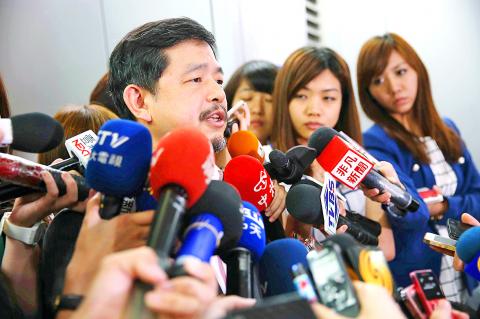The Taipei City Government should dissolve its contract with Farglory Land Development Co (遠雄建設) for the construction of the Taipei Dome, the Taipei Clean Government Committee recommended yesterday.
“We discovered that there was serious illegal profiteering and also that Farglory polluted the selection process by engaging in influence-peddling involving city officials,” committee member and lawyer Cheng Wen-lung (鄭文龍) said. “We believe the city has a sufficient legal foundation to dissolve the contract in accordance with the Government Procurement Act (政府採購法) and Administrative Procedure Act (行政程序法).”
He said that the administration of then-Taipei mayor Ma Ying-jeou (馬英九) had repeatedly agreed to contract revisions out of line with the original “public notice” inviting bids for the build-operate-transfer (BOT) construction contract, in defiance of the Act for Promotion of Private Participation in Infrastructure Projects (促進民間參與公共建設法).

Photo: Fang Pin-chao, Taipei Times
Cheng singled out revenue royalties as the most prominent example of “illegal profiteering” allowed by Ma’s administration.
City negotiators agreed to allow the firm to pay zero royalties for using the site following a secret 2006 meeting between Ma and Farglory chairman Chao Teng-hsiung (趙藤雄).
Cheng said the city’s concession violated royalty payment requirements in both its original public notice and the Act for Promotion of Private Participation in Infrastructure Projects.

Photo: CNA
Farglory profit estimates submitted to the city in 2006 put the firm’s profits at NT$117 billion (US$3.8 billion at current exchange rates) over its 50-year contract, he said, adding that the city conceded about NT$2.8 billion in royalties assuming it would have received 1 percent of the revenue.
Even without direct evidence that Ma or Lee Sush-der (李述德) — the city’s then-finance commissioner who headed the negotiation team — had personally benefited, allowing Farglory’s illegal profiteering was enough to establish legal culpability, he said.
City promises to conduct rezoning to allow Farglory to construct housing on the Dome site were also cited in the committee’s report as an example of illegal profiteering.
Other examples cited included contract revisions allowing Farglory to rent out or transfer ownership of site properties, along with the removal of requirements that profits from “subsidiary industries” be used to balance any losses by the Dome itself.
In addition, during the controversy in 2005 and 2006 over Farglory switching design contractors, Chao had twice feted city committee members, one of whom received an anonymous NT$2.9 million money transfer shortly afterwards, Cheng said.
The committee recommended that the Taipei City Government report both Ma and Lee to the Ministry of Justice for a formal investigation, also recommending that the city government increase citizen participation in future BOT contracts through referendums and public hearings.
Reacting to the committee’s conclusions, Ma expressed his “strong regret” through Presidential Office spokesperson Charles Chen (陳以信), saying that what he had done during his term as Taipei mayor was all aimed at enhancing the welfare of Taipei residents and that he was never involved in illegally profiting any private enterprise.
Quoting Ma, Chen accused the committee of “political repression” and questioned how the committee had come to such a conclusion after Taipei Mayor Ko Wen-je (柯文哲) had said that the project was “legal.”
Lee also insisted that he had acted according to the law and was not involved in anything illegal.
Additional reporting by Loa Iok-sin

Taiwan is projected to lose a working-age population of about 6.67 million people in two waves of retirement in the coming years, as the nation confronts accelerating demographic decline and a shortage of younger workers to take their place, the Ministry of the Interior said. Taiwan experienced its largest baby boom between 1958 and 1966, when the population grew by 3.78 million, followed by a second surge of 2.89 million between 1976 and 1982, ministry data showed. In 2023, the first of those baby boom generations — those born in the late 1950s and early 1960s — began to enter retirement, triggering

One of two tropical depressions that formed off Taiwan yesterday morning could turn into a moderate typhoon by the weekend, the Central Weather Administration (CWA) said yesterday. Tropical Depression No. 21 formed at 8am about 1,850km off the southeast coast, CWA forecaster Lee Meng-hsuan (李孟軒) said. The weather system is expected to move northwest as it builds momentum, possibly intensifying this weekend into a typhoon, which would be called Mitag, Lee said. The radius of the storm is expected to reach almost 200km, she said. It is forecast to approach the southeast of Taiwan on Monday next week and pass through the Bashi Channel

NO CHANGE: The TRA makes clear that the US does not consider the status of Taiwan to have been determined by WWII-era documents, a former AIT deputy director said The American Institute in Taiwan’s (AIT) comments that World War-II era documents do not determine Taiwan’s political status accurately conveyed the US’ stance, the US Department of State said. An AIT spokesperson on Saturday said that a Chinese official mischaracterized World War II-era documents as stating that Taiwan was ceded to the China. The remarks from the US’ de facto embassy in Taiwan drew criticism from the Ma Ying-jeou Foundation, whose director said the comments put Taiwan in danger. The Chinese-language United Daily News yesterday reported that a US State Department spokesperson confirmed the AIT’s position. They added that the US would continue to

The number of Chinese spouses applying for dependent residency as well as long-term residency in Taiwan has decreased, the Mainland Affairs Council said yesterday, adding that the reduction of Chinese spouses staying or living in Taiwan is only one facet reflecting the general decrease in the number of people willing to get married in Taiwan. The number of Chinese spouses applying for dependent residency last year was 7,123, down by 2,931, or 29.15 percent, from the previous year. The same census showed that the number of Chinese spouses applying for long-term residency and receiving approval last year stood at 2,973, down 1,520,